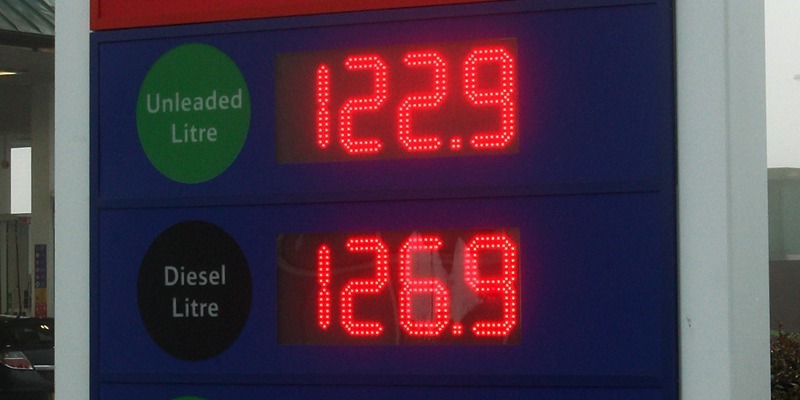The rising cost of petrol helped to push inflation up to 3.7% last month increasing the pressure on the Bank of England to raise interest rates.
According to the Consumer Price Index (CPI), inflation was driven to its highest level in eight months and 0.3% more than expected by the rising cost of food, petrol and utility bills.
The increase was driven by a 1.6% increase in the price of food the highest for a November to December period and 3.6% rise in transport costs, the highest monthly increase on record.
Petrol went up to £1.22 last month.
So far, the Bank of England’s Monetary Policy Committee has refused to raise interest rates despite the rising inflation rate, which it is charged with keeping at 2%.
The Bank has said it believes high inflation is being caused by temporary factors, such as spikes in commodity prices and January’s VAT rise from 17.5% to 20%.
The CPI has now been above its 2% target every month since November 2009.
The harsh winter is also being blamed for the rise in inflation as disruption to supplies forced prices upwards.
The cost of bread and cereals also went up after Russia banned exports after wildfires devastated crops.Living standards ‘undermined’The other main measure of inflation, the Retail Price Index, which includes mortgage repayments, also went up. It rose to 4.8% from 4.7% in November.
The rise in inflation is also bad news for savers and the elderly, who are particularly affected by low interest rates and big rises in gas and electricity prices.
Grahame Smith, general secretary of the Scottish Trades Union Congress (STUC), said living standards are falling as costs rise but said the Bank must resist pressure to raise interest rates.
He said, “With prices now running far in excess of pay deals, the living standards of Scotland’s workers are being seriously undermined.
“For those surviving on benefits, the situation is even worse.”
He added, “However, with unemployment high and the recovery weakening, it is essential that the Monetary Policy Committee holds its nerve and keep rates at their current level.
“Higher inflation is the result of a number of temporary factors such as the rising cost of imports and commodities. The VAT rise will also contribute to higher inflation in the months ahead.”Higher interest ‘potentially disastrous’Mr Smith said, “Increasing interest rates will have little or no impact on these factors but is potentially disastrous for growth and jobs.
“The Chancellor must reconsider the VAT increase in the 2011 Budget and the Prime Minister must be far more judicious in his interventions on inflation. The last thing the MPC needs is for the Prime Minister to be adding to questions about their credibility.”
Graeme Brown, director of housing and homelessness charity Shelter Scotland, warned any rise in interest rates would make it even harder for people to borrow money.
He said, “Today’s news of an unexpected rise in inflation to 3.7% raises the spectre of a rise in interest rates. This would make the cost of borrowing and mortgages an even greater burden and push families over the edge.
“The government needs to be prepared for the consequences of an interest rate rise which, against the background of an oppressive financial climate, would spell disaster for tens of thousands of families across Scotland.”
However, Howard Archer, chief European economist at financial analysts IHS Global Insight, said there is increased pressure on the Bank to raise interest rates, having kept its base rate at 0.5% for 22 months.
He said, “The MPC could well decide that a small near-term interest rate hike would support its credibility by sending out the message that it is serious about its inflation mandate, but would not have a major dampening impact on growth.”
